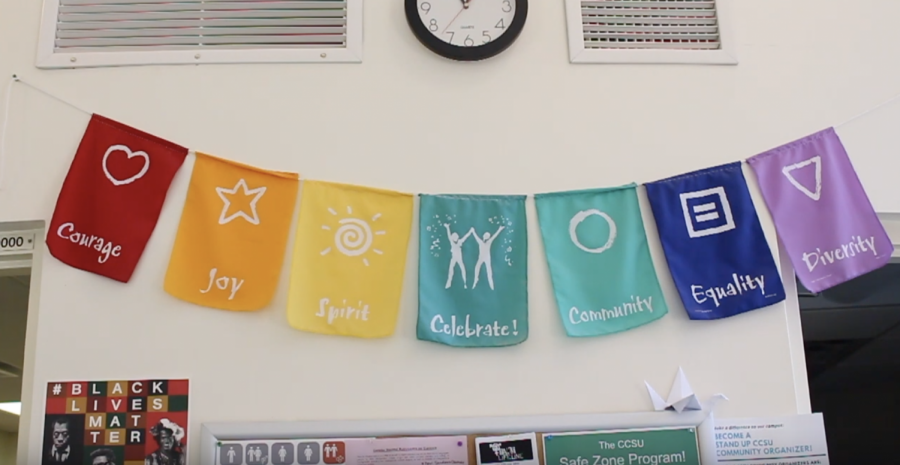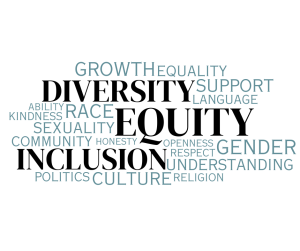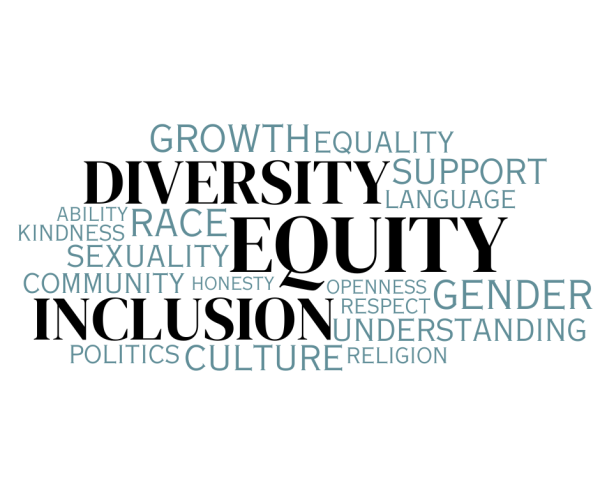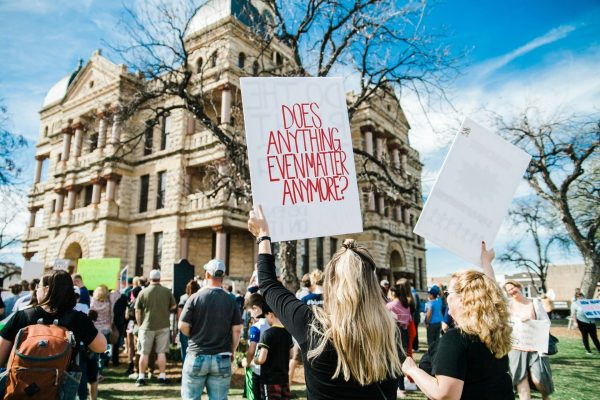Campus Advocates For Diversity Requirement After ‘Messages Of Hate’
May 7, 2019
The Central Connecticut community dressed in all black late April to peacefully protest against hate crimes that arose on campus, but the lack of direction for what will happen next is worrisome for many Central students and faculty.
The Black Student Union and PRIDE came together to protest hate crimes against their communities and to promote diversity and change after the n-word was spray painted onto two campus buildings last month. The slur since been removed by Facilities Management.
Additionally, CCSU President Dr. Zulma Toro stated in an email that, “In the weeks following, an anti-gay brochure promoting conversion therapy was placed inside a classroom where LGBTQ fiction is taught. In Feb., a sign outside the LGBTQ Center was ripped down, and a student in the Center reported overhearing several people outside of the Center using gay slurs.”
Regarding the graffiti, Central police department sent camera footage to the state police to try and enhance the quality, but no suspect has been identified yet, according to CCSU Detective Densil Samuda. No further information from the police regarding the investigation can be given at this time.
In the email, Dr. Toro called the turnout for the rally impressive, but was unable to attend herself due to a mandatory meeting in Boston. But PRIDE President Armando Osorio and BSU member Evan Wilcox, who both attended the rally, hold a different view.
“There were definitely some faculty and their presence was definitely there. However, I think there could have been more faculty,” Osorio said. Wilcox “did not see enough faculty at the rally” either.
“I hold a deep love for everyone that did show up, and a greater respect if any of them walked out of their classrooms to join us,” Wilcox said. English Professor Dr. Gilbert Gigliotti, who Osorio recalled as having seen at the rally, also noted that “not enough faculty, administrators, and students attended the rally.”
Not having answers as to who committed the hateful acts does not sit well with Osorio or Wilcox. Osorio said in an interview that she doesn’t want another hateful act to happen again and people who think in hurtful ways bothers her deeply.
“Central is supposed to be a welcoming environment and even if it’s not at base level, it should be neutral. It should be a place where students can feel comfortable to at least go to their classes and leave. Having that mild attack on the community really made people feel unsafe,” she said.
Wilcox stated that it is “suspicious” to him that the person who spray painted the slurs were allegedly in the blind spot of the camera and that no other cameras were able to catch the suspect.
Central’s code of conduct prohibits acts of “intolerance” and of “hatred or violence” based on race, religion and sexual orientation among others. In the section of prohibited conduct, the policy states that offensive or disorderly conduct is prohibited, but distinguishes that this does not apply to constitutionally protected speech.
“Central’s codes are a bit vague,” philosophy professor Dr. Audra King said.
What faculty can do, King said, is to create a task force with students and faculty advisors to respond and prevent hate crimes. Some of her ideas to respond to hate crimes include organizing counter-protests, hosting open forums to discuss the impact and inviting speakers to campus.
King’s task force prevention ideas included creating surveys for students and faculty to assess campus climate as well as organizing events on campus to create a more “inclusive and equitable climate.”
Osorio said that she believes a way to prevent hate crimes on campus would be through a diversity requirement for everyone. This idea was attempted last year by then-Student Government Association President Brendan Kruh and previous CHANGE-CCSU President Victor Constanza, as well as by others, but the requirement never came to be.
Kruh stated that, at other colleges like the University of Connecticut, there is a diversity prerequisite for study-based classes. UConn requires six credits of diversity and multiculturalism.
“You would have to take a certain number of credits, maybe six or eight, with that designated course to be eligible for graduation and the thought process behind that is, I think, they are trying to help their students become open to different ideas, be well more rounded and be cognizant of other communities,” Kruh said.
For Kruh, a CCSU linguistics class where a topic of discussion was people getting told they aren’t smart enough if they don’t speak standard American English was as an “eye opener” in seeing that some people think just because a community talks a certain way, they are less intelligent.
“So, a class like that could even be considered and that would count towards graduation,” Kruh said. He talked to many people to get this requirement in action, including Dean of Graduate Studies Glynis Fitzgerald. The diversity requirement idea was not an easy transition if it was going to happen.
“We started to have conversations about wanting to maybe do this, but it came up that there are some professors that felt as though if you’re physics major, how would that fit with the curriculum and how would students have time to take those classes? If you’re a transfer student, how do you take those classes? There was apparently a lot of pushback and some professors just didn’t want it,” Kruh said.
The conversation got to the point to where Beth Merenstein, sociology professor and chair of the Curriculum Committee, talked with Kruh about trying to facilitate the idea and gather allies within the faculty to start to forcefully push for that change.
In an interview, Merenstein said that a group of faculty has been trying to get a diversity designation, or d-designation, for over ten years. A d-designation course is a general education course which tackles issues like social equality, social justice and discrimination against races, sex and religion, as well as others.
The requirement idea never took off, Merenstein said, because of too much resistance from faculty. “They [faculty] didn’t want to give students another requirement. Others felt that it wasn’t necessary, and then then there was a lot of discussion as to who would define what diversity is.”
The only way to get the diversity requirement passed is if general education requirements are changed. The diversity idea would be brought up again then. But Merenstein does not see this happening soon, adding that Central needs to have one.
“After seeing the events that took place on campus, an action that take place regularly, our students need to be educated on issues about race, racism, homophobia, sexism and all sorts of things. Also, students are all going out into a diverse world. You should be educated and aware of the world you are entering into,” Merenstein said.
Not all professors, like Kruh and Merenstein stated, agree with the requirement, but do think faculty can improve more without it. Psychology Professor Dr. Jason Sikorski said that such a requirement would interfere with “academic freedom.”
“I feel very uncomfortable about that and many others do as well,” Sikorski, who was not at the meeting with Kruh and Mereinstein, stated. “I think professors perhaps can continue to empower students and provide them with information and the tools to develop their own opinions reasonably, to weigh evidence reasonably.”
Sikorski also stated that he feels that faculty does not always have a huge voice in certain areas because there are so many different opinions on what should be done. He is also frustrated when faculty “talk about faculty rights or protecting faculty” while discussing “instances of turmoil,” but also noted that some professors may be worried about their previous actions being talked about and getting in trouble, though he believes this is a minority opinion.
Educating people on diversity, Sikorski mentioned, is what faculty can do, as well as educating on mental health issues that people in certain communities deal with, like after conversion, which Sikorski said is unethical. The practice attempts to “convert” someone who is not straight into being straight.
“LGBTQ communities are [an] at risk population for depression, anxiety, drug abuse [and] a variety of mental health problems. There is nothing in the bodies or minds of people who have a different sexual orientation than heterosexuals that causes this to occur. It’s quite literally the reactions of others that cause such distress and disruption to identity development that make these folks suffer,” Sikorski said.
To improve LGBTQ issues, Osorio believes that “creating a safe environment” for LGBTQ students, like by expanding CCSU’s preferred name policy, is beneficial.
“However, there needs to be more of an enforcement between faculty of how to use the correct pronouns that a student wishes to use without feeling outted,” she said. On a different note, Wilcox believes that Central should make a mandatory racial sensitivity requirement for students and faculty.
With the spring semester winding down, Sikorski said hate crimes are in danger of being forgotten and further tolerated.
“This could get put to bed. We have a public relations group and they’ve managed to quiet the public discourse about some of these issues and we’re at risk for some of these to get swept under the rug as the summer months approach,” Sikorski stated.









